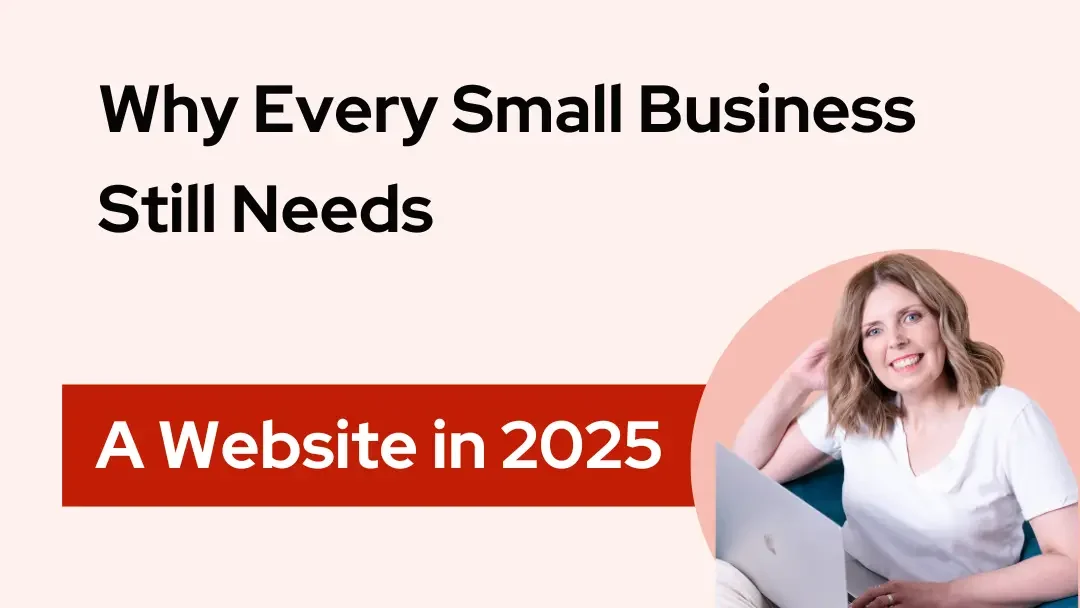Does your Small Business Still need a Website in 2025?
AI is everywhere. Tools like ChatGPT are becoming part of our daily lives, and even Google has rolled out its own AI Overviews that answer your questions at the very top of search results. The catch? In many cases, people don’t even need to click through to a website anymore.
That can leave small business owners wondering: if people are getting answers straight from AI, is a website still worth it?
My answer is simple: yes, absolutely. Here’s why.
1. Your Website = Digital Insurance
If your business relies only on a Google Business Profile or social media, you’re on shaky ground. I’ve seen it happen to clients: one policy change, one flagged post, one small “violation” — and their entire account vanished overnight.
That means all those hard-earned reviews? Gone. The Facebook memories? Gone. The visibility they were relying on? Gone. Reinstating an account is possible, but it’s stressful, time-consuming, and sometimes impossible.
Your website, by contrast, is far more stable with reliable hosting and backups in place, and full admin access; your site is always yours. That means you’re not just renting space on a platform; you own a piece of internet real estate that can’t disappear because of an algorithm change.
In an uncertain digital world, that stability is priceless.
Reference:
2. Your Website Proves You’re Legit
Think about your own behaviour. When you discover a new brand on Instagram, or someone mentions a business to you, what’s one of the first things you do? You Google them.
And if they don’t have a website? Red flag.
A professional site signals legitimacy. It tells potential clients you’re real, established, and trustworthy. It gives you the space to show the things social platforms can’t: your story, your values, your process, your results.
Research shows consumers expect businesses to have a website, and they place more trust in information published on a website than in a social media post.
References:
“Do I Need a Website if I Have Social Media?” (Webnode): https://www.webnode.com/blog/website-vs-social-media
- Even in the age of social media, small businesses still need a website. A website gives you more control, builds trust, and complements your social presence — it’s not either/or, it’s both.” [GoDaddy UK]
3. Your Website Feeds the AI Era
Yes, fewer people are clicking through from search results. Data from Ahrefs shows that when Google’s AI Overviews appear, click-through rates can drop by over 30% for top-ranking sites [Ahefs, 2024].
But here’s the key: AI still has to pull its answers from somewhere. And that “somewhere” is the internet. And what makes up the internet? Websites.
Here’s the nuance: you don’t need to churn out generic “informational” blogs that AI already has covered. What you do need is content that answers the questions your clients actually ask, the brand, service, and commercial intent queries that tie directly to your expertise. Think FAQs, case studies, how-tos that show your process, and articles that address the “should I?” and “how do I?” questions your clients Google before working with you.
And when AI tools give citations or source links, guess what they link to? Not your Instagram profile. Not your Google Business Profile. Websites.
References:
Semrush AI Overview study (13% of queries trigger AI Overviews): https://www.semrush.com/blog/semrush-ai-overviews-study
Ars Technica coverage: https://arstechnica.com/ai/2025/07/research-shows-google-ai-overviews-reduce-website-clicks-by-almost-half
4. Your Website Is a Business Hub
Websites used to be digital brochures: a few pretty pages with your logo and contact details. Not anymore.
Today, your website can be the central hub of your business. It can take bookings, showcase services, deliver lead magnets, capture email sign-ups, sell products, or even process payments.
Take Fiona, a florist in Wollert, Melbourne. For her, the website isn’t just an online storefront where customers can browse bouquets; it’s also her blog, where she shares seasonal wedding flower trends. It’s where her customers sign up to her email list to hear about special promotions. It’s where she can run holiday campaigns, sell arrangements directly, and keep her audience connected long after the flowers are delivered.
In other words, her website doesn’t just sit there. It actively works for her every day.
That’s the difference between having a website and using your website as a true business hub. And unlike social platforms that can change the rules overnight or lock you out, a website gives you control over your own digital space.
Reference:
Example on websites as hubs: https://www.webnode.com/blog/website-vs-social-media
5. Your Website Is Part of the Customer Journey
Here’s something I see all the time: people may find you on social media, through word of mouth, or even at an event, but before they make a decision, they’ll almost always check your website.
Why? Because it’s where everything comes together. It’s where they can learn more about you, compare options, see your process, and decide if you’re the right fit.
“Social media sparks interest — your website seals the deal.”
Industry experts talk about 10–20 “touchpoints” before a customer converts. The exact number varies, but the point is this: people rarely say yes after one interaction. Your website is one of those critical touchpoints and often the one that tips someone over the line from “interested” to “ready.”
Reference:
Touchpoint discussion: https://www.hubspot.com/marketing-statistics (general buyer journey research)
6. How to Keep Your Website Working for You in 2025 (and Beyond)
Your website isn’t something to launch and then forget about. One of its strengths is that it gives you a stable foundation you can rely on, but it also has the flexibility to grow with your business.
Here are a few simple ways to keep it working for you:
Keep your info current. Make sure services, pricing, and contact details always reflect where your business is today.
Share your wins. Add new testimonials, projects, or client stories when you can — they show clients you’re active and trustworthy.
Use it as your hub. Whenever you post on socials, run a campaign, or send an email, link people back to your website.
Check it like a customer. Visit your own site now and then as if you were new. Is it clear what you do and how to take the next step?
Let it evolve with you. As your business changes, your website should reflect that. Small updates over time keep it relevant without needing a full rebuild.
Your website doesn’t need constant tinkering to be effective, but it does need to stay alive and aligned with your business. That’s how it remains both steady and adaptable, supporting you every day.
Final Thoughts
Websites are still very much alive. They’re not just a nice-to-have; they’re your digital insurance, your trust signal, your AI-ready content base, your business hub, and your customer’s final checkpoint before making a decision.
Social media and AI tools are valuable, but they’re not built to be your home base. Without a website, there’s often nowhere solid for people to go next, no place where you’re fully in control of the experience.
You don’t just need a website. You need a working website, one that supports your business every single day, showcases your value, and keeps you in the conversation in an AI-driven world.
Ready to Put Your Website to Work?
If you’ve been wondering whether a website is still worth it in 2025, the answer is yes — but not just any website. You need a site that builds trust, supports your customer journey, and acts as the hub for your business in an AI-driven world.
That’s exactly what I design for my clients: strategic, SEO-smart websites that don’t just look good — they mean business.
👉 Explore my Website Design Packages or book a free Website Checkup today and let’s make sure your site is working as hard as you do.
You May Also Like…
Create a Blog Post on WordPress plus Bonus SEO Tricks
Today, I’m excited to share a quick tip video on how to create a stellar blog post on your WordPress…
The Impact of Paradigm Shifts in Business Strategy
The Impact of Paradigm Shifts in Business Paradigm shifts is a term often thrown around in…
A Guide to Embracing Your Inner Salesperson
Unlock your sales potential with our comprehensive guide to embracing your inner salesperson. In tod…




